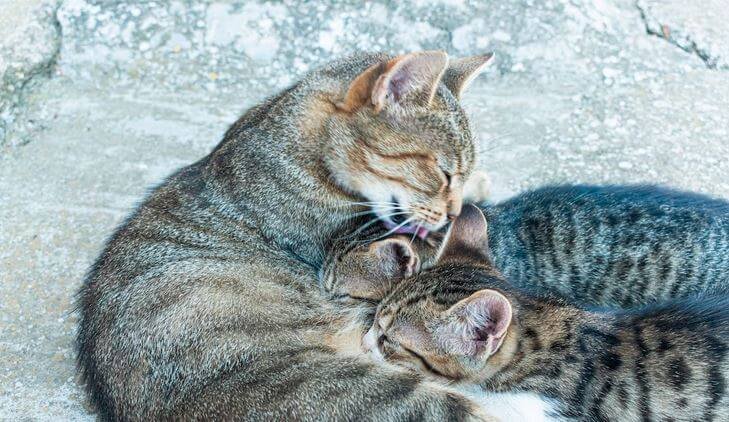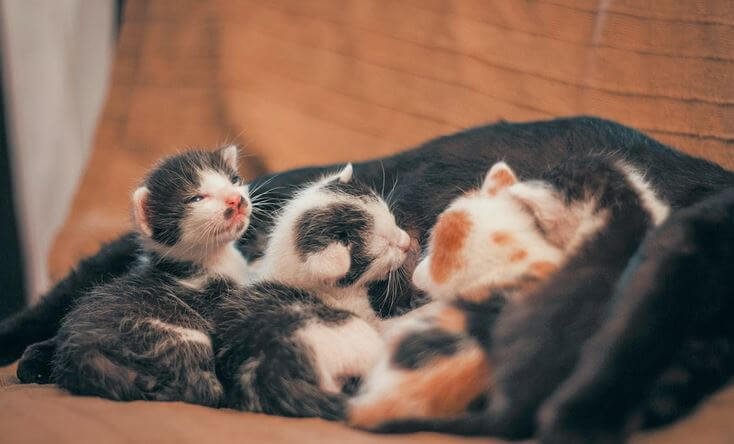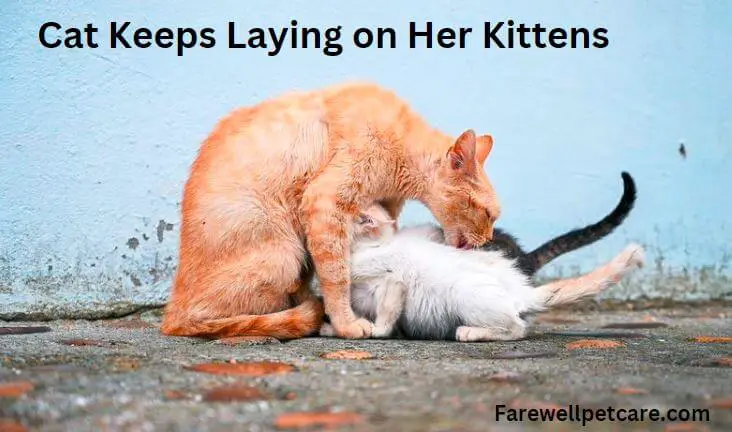At such a tender age, a kitten’s body isn’t well developed and must be handled with utmost care. Therefore, it can be unpleasant if a mother cat keeps laying on her kittens. And as a cat owner, you may question the causes of this behavior and what you can do to stop it.
A mother cat can lay on her kittens for various reasons. She may be an inexperienced first-time parent trying to safeguard her kittens or lack adequate space in her nursing area to enjoy some room to herself. Fortunately, there are ways to prevent this problem.
Keep reading this article as we dive deep into why a mother cat keeps laying on her kittens. We shall discuss some measures to protect the kittens and prevent future occurrences and also answer some frequently asked questions.
4 Reasons Why Cats Keep Laying on Their Kittens
While it’s relatively common for mother cats to lay on their kittens, it can be rather daunting for owners to witness it, as there’s always the probability of kittens suffocating. Let’s take a closer look at the main reasons for this behavior.
1. Lack of Motherhood Experience
A first-time mother cat can keep laying on her kittens because she lacks the experience of motherhood and doesn’t understand the risks of this behavior.
As in humans, being a first-time mother can be challenging for animals. Motherhood is a transformative event that requires significant life adjustments to accommodate the family’s newest additions.
It can get tough and overwhelming for a cat who has just had kittens for the first time. In that, they’ve had to take care of themselves all through and now are fully responsible for the lives of an entire litter.
A momma cat can produce anywhere between 1 to 12 kittens per litter! Research shows that the more kittens in a litter, the more stress she can handle. Even a mother’s intuition cannot adequately prepare one for such a scenario.
A first-time mother cat often feels anxious because of the little experience. They may lack the maturity of an experienced mother to understand the potential dangers of laying on her kittens.
Furthermore, most household cats haven’t had the opportunity to be around anyone else’s kittens. Therefore, they can easily underestimate their kitten’s fragility.
Find Out: Male Cat Meowing in Litter Box: 7 Causes and Solutions
2. Providing a Warm Environment

Temperature is an essential part of kitten development. Newborn kitties cannot control their body temperature as adult cats do. They need their environment kept warm to develop.
The ideal ambient temperature for housing newborn kittens for up to 2 weeks is about 85 degrees Fahrenheit (approximately 30 degrees Celsius).
If the temperature drops below 85℉ (29.44℃), it can become dangerous for the kittens. Similarly, it can be equally hazardous if the temperature gets too hot, resulting in dehydration and heat exhaustion.
A mother cat may try to balance temperatures in the nursing area. The motherly instincts might make her lay on her kittens to keep them warm when temperatures drop. Alternatively, she might get away from her kittens to allow temperatures to drop if it gets too warm.
Also Read: Why Do Cats Run After Pooping? Causes and Their Solutions
3. Space Constraints
Your cat may be laying on her kittens simply because she lacks enough space to nurse them in the birthing area. This is a situation beyond her control. It will be difficult to avoid sitting on her young ones if they’re too packed.
Even though the nursing space should be kept warm, you need to ensure that it can accommodate the entire litter adequately, allowing room for free movement.
4. Protective Measure
Mother cats are fiercely protective of their kittens. They can safeguard their young ones from danger or unfavorable environments by laying on them.
By doing so, she is providing the best security for her kittens, and any present dangers must pass through her first.
Sometimes the threat may not be so obvious, such as the presence of nearby dogs or other dangerous animals, but you’ll still observe your cat laying on her babies. This may be due to cats’ wild instincts – the fear of detection and predation on their brood.
It’s also worth noting that momma cat may see you and other family members as a threat if you interact with her litter at their very early stages. If unhappy, she may become aggressive and overprotective – hiding her kittens by laying on them.
5 Ways to Prevent Cats From Laying on Their Kittens
If a mother cat keeps laying on her kittens and nothing is done about it, they will be at risk of dying. It’s impossible to stop this behavior, except if you remove the mother from her babies, which experts advise against.
All in all, here are a few options that will help limit this behavior.
1. Create Enough Space

As mentioned, one of the key reasons a cat keeps sitting on her kittens is inadequate space in her nursing quarters to accommodate the entire family.
You’ll, therefore, want to ensure that your cat and her litter have ample room to move about sufficiently. But again, the nursing area shouldn’t be too big for the kittens to feel lost and exposed.
According to Sage Journals, you should ensure at least 1 m2 (11 sq ft) of floor space per cat in the nursing quarters for safety.
2. Create a Quiet and Safe Environment
A safe and quiet environment allows a cat to focus on nursing her kittens instead of worrying about her surroundings.
Anything that can make a mother cat misjudge the situation as threatening should be avoided as much as possible since it can lead to her laying on her kittens to protect them.
Ideally, you should set up the nursing area in a quiet, safe environment with little or no interference from family members – humans and other pets.
Too much interaction will likely increase the cat’s anxiety levels, making them overprotective of their kittens. It is best to avoid interaction for the first few weeks. But if it is necessary, only interact with the momma cat.
Some of the best places to setup the nursing quarter include:
- A spare room: A separate room, such as a spare bedroom, can be an ideal choice. It provides privacy and minimizes disturbances. Ensure the room is well-ventilated and has good lighting.
- Walk-in closet: A walk-in closet can make an excellent, quiet space, especially if it’s rarely used. Make sure it’s well-ventilated and has a light source.
- Laundry room: A laundry room can be a quiet and safe spot if it’s kept tidy with detergents and chemicals kept out of reach.
- Large dog crate or pen: If you don’t have a whole room to spare, you can set up a large dog crate or pen. This offers a contained space that can keep the kittens safe and separate from other pets or children.
- Quiet corner of a bedroom: If you can’t dedicate an entire room, choose a quiet corner of a bedroom that can be partitioned off. Ensure the cat feels secure and isn’t exposed to too much noise or light.
3. Ensure the Temperature Is Right
As mentioned, neonatal kittens rely on external heat sources to stay warm and comfortable. Ordinarily, they get this warmth through contact with their mother’s body heat.
However, if the room gets too cold, you’ll need to provide them with a heat source to prevent the mother cat from laying on her kittens.
A warm water bottle will do the job well. You’ll want to avoid using heat pads since they can easily overheat the kittens, resulting in dangerous dehydration episodes.
Similarly, avoid using blankets as they can easily trap the kittens and potentially suffocate them.
Restricting the heat source to one area is crucial to allow the kittens to move away when they’re too warm. Lastly, check the nursing area’s temperature regularly to prevent it from being too cold or warm. The ideal temperature range for neonatal kittens is 80 to 85℉ (26.67 to 29.44℃).
4. Supervise Activity Frequently
While you shouldn’t disturb the cat and her babies, monitoring their activities regularly will help limit catastrophic accidents. This is particularly crucial for a first-time mother.
Understandably, this isn’t a foolproof method of preventing a mother cat from sitting on her kittens because it’s impossible to monitor them throughout.
However, keeping a close eye might help you catch them getting squashed, and you can quickly intervene before any significant harm is done.
5. Employ a Surrogate Mother
Getting a surrogate mother to care for the kittens is usually the last option, but not one to be underestimated.
If you feel the mother cat seriously threatens her babies or has harmed kittens from her previous litters, it’s best to discontinue her from nursing.
Separating the kittens from their mother could be the only option to keep them safe and healthy. But first, you’ll need to find them a suitable surrogate to continue nursing. Consider checking with your vet first before taking this step.
Why Did My Cat Smother Her Kittens?
Your cat may have accidentally smothered her kittens because she’s a first-time mum with little experience in motherhood. Therefore, she may have misjudged the repercussions of this action.
Cats make loving and caring mothers, so suffocating her kittens is usually not out of malice.
She probably sat on her kittens to keep them warm or protect them from imminent danger. Or, the birthing space was too small for her and her babies.
On the flip side, you might conclude that your cat has smothered her kittens by laying on them, but in fact, they died of natural causes. It may be a matter of misinterpreting the event.
Kittens below eight weeks are four times more likely to die than cats between one and three years. Studies also show that the average kitten mortality rate between birth and one year is 34.5%.
This can be attributed to risk factors such as:
- Low birth weight
- Size of litter
- Breed
- Blood type compatibility between the male and female cat parents.
Do Cats Reject Kittens If You Touch Them?
A mother cat cannot reject her kittens if you touch them. This is a common misconception. A cat will most likely continue caring for her kittens even after human interference.
But don’t be shocked if you find them moved when you check on them next. This usually happens when the cat is unpleased by the interference and needs to protect her babies. The best thing is to leave them alone.
In the same breath, your cat may reject one or multiple of her kittens if:
- The kitten is sick or deformed. The mother rejects it to protect the other kittens.
- The mother has mastitis and doesn’t want to be suckled because of the pain.
- The mother has too many kittens to handle. Due to the inadequacy of milk, she may reject the weaker ones within a day of giving birth and save the healthy ones.
- The mother is a first-time parent with insufficient maternal skills. Such cats are confused, overwhelmed, and traumatized.
If your momma cat has rejected her kitten(s), getting both of them checked by a vet is essential. The vet will advise on the best way forward to save the kittens. They may prescribe appropriate medications and show you how to feed and keep the rejected kittens warm.
Can a Cat Suffocate a Newborn Kitten By Sitting on Them?
A cat can suffocate a newborn kitten by sitting on them. This is highly possible within the first few weeks of life when the kitten doesn’t have enough strength to crawl out from beneath or vocalize its predicament.
Not only will they die of suffocation, but also injury from being crushed.
Newborn kittens have very delicate bones and organs. It doesn’t require much for them to get injured. They’re highly likely to fracture their bones when not taken good care of.
To put things into perspective, an adult cat averages 10 to 12 pounds. In contrast, a newborn kitty weighs about 4 ounces. The weight difference shows how dangerous it can be for a cat to sit on her kitten.
The stress a mother cat experiences during this period, alongside motherhood inexperience and environmental concerns, can result in such a mishap.
Final Words
A mother cat keeps laying on her kittens for several reasons. She’s likely an inexperienced first-time mum trying to protect or keep her kittens warm. Whatever the reason, mother cats do not maliciously do it.
So, ensure they have adequate, quiet, and warm enough space to nurse their kittens. Also, always keep an eye on them but don’t bother them.

